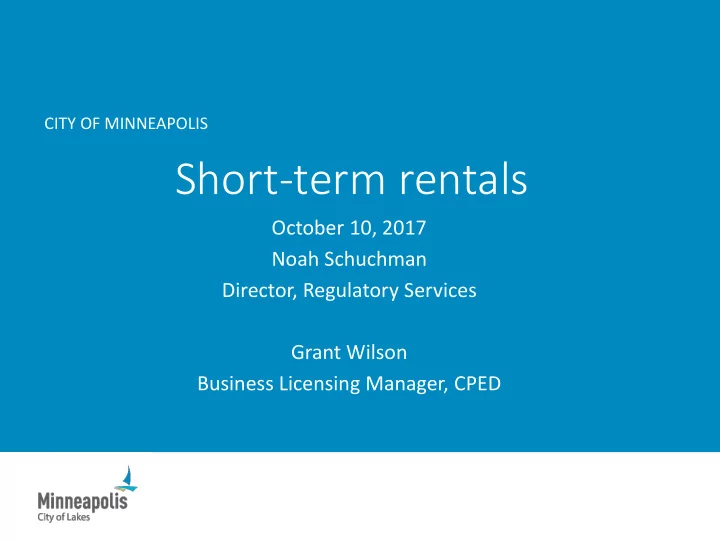

CITY OF MINNEAPOLIS Short-term rentals October 10, 2017 Noah Schuchman Director, Regulatory Services Grant Wilson Business Licensing Manager, CPED
Council staff direction Staff Direction by Council Member Frey September 21, 2016, Committee of the Whole Frey directs the City Coordinator’s Office to convene a workgroup to examine the home-sharing industry, including a review of the marketplace served by businesses such as Airbnb, Couchsurfing, HomeAway and others. The workgroup shall include representatives from the City Coordinator’s Office, Community Planning & Economic Development, Finance and Property Services, Intergovernmental Relations, Regulatory Services, City Attorney’s Office and Meet Minneapolis along with representatives from existing homesharing businesses and key stakeholders in the marketplace. 2
Workgroup representation The workgroup included representatives from: • Internal City departments: Nuria Rivera-Vandermyde (City Coordinator), Sasha Bergman (IGR), Noah Schuchman (Regulatory Services), Kim Keller (Regulatory Services), Grant Wilson (CPED), Bradley Ellis (CPED), Steve Poor (CPED), Mei-Ling Smith (Health), Joel Fussy (City Attorney’s Office), Mark Winkelhake (Finance), and Matthew Hendricks (Finance) • External departments: Brent Forester, Sandy Christensen, Bill Deef, and Melvin Tennant (all Meet Minneapolis) 3
Workgroup process The workgroup met from October 2016 to May 2017 and covered topics including: • Financial/tax implications • Review of other cities’ ordinances • The Minneapolis housing and rental markets • Input from stakeholder groups, including: Airbnb, Expedia, hosts, hotel lodging industry Through this work, the group defined a short-term rental as the rental of a dwelling unit for a period of less than thirty (30) consecutive days, for tourist or transient use 4
Research of other jurisdictions • Ordinances and policies vary depending upon the needs of the jurisdiction • Some cities prohibit entirely, while others have varying levels of restrictions Proposal requires that the dwelling used for short-term rental have a license, and will require the booking platform to be St. Paul, licensed. Special restrictions include a limit of 50% of units in a building, and a CUP for very large dwellings in residential zones. Minnesota Inspection required. Duluth, Allows owner occupied and non-owner occupied properties. The dwelling must be licensed, not the platform. Higher fee for Minnesota non-owner occupied properties. Limited to 60 vacation dwelling units. Inspection required. Eagan, Allows for short term rentals in residential zones. Minnesota San Owner must live in building nine months of the year. 90 days per year maximum rental. Platforms must follow rules to remove Francisco, unlicensed units, etc. License required for the dwelling. CA Portland, Owner must reside in the building nine months of the year. License required for the dwelling. Platforms may not license OR unlicensed or problem properties. Allows non-owner occupied properties. No restrictions on the number of days rented in a year if owner occupied. License Austin, TX required for the dwelling. Inspection required. 5
Current status Regulation • In most situations, short term rentals are currently not regulated in Minneapolis. This has several implications. • Properties without a rental license will only receive an inspection based upon the following: • Complaints • Life-safety concerns • Referrals post-fire • Organized neighborhood sweeps • The number of short term rental units are not being tracked • Tax revenue is not collected Industry impact • In Minneapolis, recent estimates suggest more than 1,600 properties are available for short term rental • Dramatic increases in the industry are expected around large events such as the Super Bowl, X Games and the NCAA Final Four 6
Draft ordinances Staff propose regulation of both the platforms and hosts Business Regulatory Licensing Services licenses the licenses the platforms hosts Title 13, Title 12, Chapter 351 Chapter 244 7
Chapter 351 Proposal Annual business license required for short term rental hosting platforms • Identifies true owners and operators of each hosting platform • Insures that hosting platforms remain law abiding • Provides communication opportunities to host property owners • Hosting platforms may not list non-compliant properties • Hosting platforms to accurately collect taxes • License fee recommended to be set at $5,000 annually 8
Chapter 244 Proposal 9
Financial impacts of proposal Revenue Expenses Estimated sales and $700,000 entertainment tax Platform business license $5,000/platform Follows Tier 1 and 2 rental Host rental license fee license standards Host registration fee $46/year per registered unit Staffing: Customer Service 1 FTE in 2018 Representative Unknown in future years 1 FTE in 2018 Staffing: Housing inspector Unknown in future years $45,000 in 2018 Data scraping services Annual fee tied to number of listings 10
Next steps Pending October 20 passage • Begin accepting applications December 1 Communications • Web presence • Property owners workshop • Provision in Chapter 351 • Connection to Super Bowl committee 11
Questions? 12
Recommend
More recommend